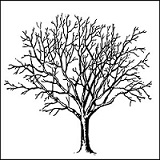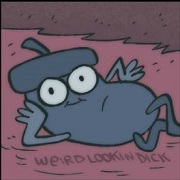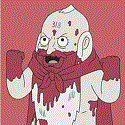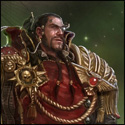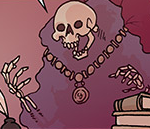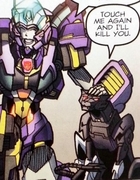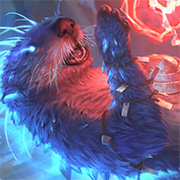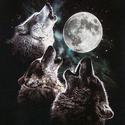|
i feel like theres something to be found in how abyssal entities affect the human world and the disquiet that follows a promethean
|
|
|
|

|
| # ? May 27, 2024 10:29 |
|
Crasical posted:Isn't the point of Horrors that sometimes there's one-off madness that nobody can adequately explain? Despite the most obsessive of occult investigators nobody is sure WHY Death Bed: The Bed that Eats People is there. Some poo poo just be. Yes, though I think there's more than a little 'here's an easy way to make monsters without needing other books' too. quote:I'll keep holding out for a universe where 'everything is Mage (or sometimes Werewolf)' isn't true. In gameline books they're generally going to focus on gameline issues, but we do have a lot of out of context problems and through the blue books we can clearly see that there's a poo poo ton of stuff that does not involve any gameline. Fans can link it to them (and they will, part of fandom is trying to make connections and assimilate external media into your fandom nowadays), but yeah sometimes Death Bed is just there. And random Supernatural Warlord may be an evil tyrant, but that doesn't mean he's a cultist of the General and gets whispers from them in his dreams. The blue books were really good at this, Skinchangers, Immortals, Inferno, Mysterious Places, Midnight Roads, Reliquary, even the genre books, Asylum and Tales of the 13th Precinct have tons of stuff that don't spawn from the gamelines. nofather fucked around with this message at 04:27 on Dec 1, 2018 |
|
|
|
im not looking for anything to be explained perfectly, i just want to know what explanations nonmage splats might come up with at mage-level :v
|
|
|
|
I think a thing to remember about mages seeing and unraveling mysteries through Supernal symbols, and manipulating them through the Arcana, doesn't make those mysteries suddenly start working specifically through Arcana-based rules. Figuring out the Supernal explanation for Dominate 5 doesn't make you able to easily replicate it with Mind.
That Old Tree fucked around with this message at 04:35 on Dec 1, 2018 |
|
|
|
Tollymain posted:im not looking for anything to be explained perfectly, i just want to know what explanations nonmage splats might come up with at mage-level :v
|
|
|
|
My position is that everything fits into Mage cosmology not because of prescriptive things like 'Mages define what reality is and nothing but the Abyss exists outside of that' and more the descriptive level of 'Mages are working with the semantic level of reality, and things with no semantic consistency are best understood as Abyssal intrusions.' Being a grammar expert can help you understand how a sentence works, or what qualities it has, but it doesn't mean you know the contents of the book ahead of time. There are also things written in languages other than the Supernal Symbols - primarily things from what Mages class as the Lower Depths but could be more fairly called 'places that aren't fully translatable into the Supernal.' Now, according to Mage, and I think this is a fun and useful framework, those places are generally worse than our world and more dangerous in various ways. Then there's the Abyss, which is just corrosive and meaningless stuff, having no true grammar. It's a hole in the book. Something that follows no rules, has no tendencies or ways it works, is Abyssal. If Death Bed has an ordered structure to it, regardless of where it comes from or why it Death Beds, that can be expressed as Supernal Symbols, which is about as meaningful as saying 'this serial killer can be expressed in terms of physical laws!' So Death Bed isn't something a Mage would necessarily be able to predict, but they can dissect it and explain what it's made of in Supernal terms. That doesn't mean, unless they're very insightful and can put together the clues like a Hunter (but with X-ray vision) they can tell where it came from or how to create one, but they might be able to say 'ok, yeah, this has Matter and Death in it, it eats its victim's souls as well as their bodies, and it doesn't really have much of a Mind. Also, it's maple wood.' With Time and Fate they can also figure out where it came from physically and historically, and put together the processes that caused it to exist, until they reach the end of their mystical competence or the clues run out.
|
|
|
|
I know part of their deal is that they're super disorganized, but I wish there were more examples of Crone cosmology in nVampire, it seems like it could be a rich area to explore. Other nVampire cosmologies are pretty Christian - the Sanctum, I think, is "actually just Christianity but we're evil" and the Ordo's cosmology is "I dunno, Christianity I guess? now let me tell you about this crazy blood alchemy I've been up to." From what I've been told, Beast has a clear non-woof non-mage cosmology, and also from what I've been told it should be avoided as much as possible. Changeling cosmology is pretty focused on Fae poo poo, out of necessity. If you're a Changeling with the wisdom and clarity to ponder the lower depths and you do that instead of pondering the hedge, you're going to piss off most of your support structure. Seems like Changelings only give a gently caress about wider cosmologies when they run into Mages and are like "oh you guys know about arcadia too? wait, what?" Demon has less of a cosmology than you'd expect, and that's awesome. Geist has a cosmology (chthonology?) but I don't know enough about it to be say anything. I can't remember if Mummy has one too, because I was too annoyed at Mummy for using weird 1.5 edition rules to give it a fair shot. In general I think a lot of the reasons Mage gets the higher level view is that mages stick their noses in a bunch of stuff they probably shouldn't, and also have the widest toolset. They're the only splat that can interact with the majority of the weird metaphysical realms, most have one they specialize in. Mages are also predisposed to naval gazing. Like, what happens if you throw a devote follower of the Crone into the hedge? He'd probably think it was loving metal and cool and wonder if the Crone works in mysterious ways. What happens if a Geist slips past the gauntlet? She might wonder where spirits go when they die. In general, the other splats are too busy doing their own poo poo to stop and try and categorize, order, and understand how the various realms they have little to no access to interact. On the other hand, categorizing, ordering, and (failing to) understand stuff is the poo poo that mages are busy doing. Well, that and vicious guerrilla warfare for highfalutin philosophies
|
|
|
|
The most lethal years on record pansplat (other than Wraiths, for whom known fatalities are actually extremely low without factoring in extinction events like EoE and Orpheus) are 1999 (no less than 50% of all known deaths took place that year), 1994 (12%), 1993 (5%), 2004 (2% even without apocalypse content), 1997 (2%), 2000 (2%) and 1995 (2%). Dropping out of the Modern era, 1558 has a royal 1% claim. I'll do a century and decade breakdown later, but basically 95% of all known deaths among supernatural beings take place in the 20th century, with an unsurprising skew towards 1999's major events, 97's Garou battle of Kursk, and the Garou Nation-Chicago Principate War of 1993.
|
|
|
|
Werewolf has a pretty good model. It interacts with the same stuff that Mage does, it's not an incompatible model of the world and I don't know why people would even want that -- it just focuses on the parts of it that matter to them.
|
|
|
|
Werewolf, Geist, and Beast respectively focus on the three ephemeral realms of the Shadow, Underworld, and Astral. They have narrower but deeper knowledge, tinged by being at least part-native. Mummy and Changeling have their own cleanly demarked cosmologies of outer realms that stick off at right-angles to those three, the way oChangeling didn't fit into the High/Middle/Low Umbra of cMage/cWerewolf/Wraith. It is explicitly canon, and I am *constantly* beating writers over the head with it, that the Supernal Realm and the Arcana are like "Maths" or "Physics" and outside of mages' own spells and rare Mysteries the overwhelming majority of supernatural occurances in the nwod are not caused by it, but can be measured by it. A mage can watch a vampire hypnotise someone and understand it as a mental power with Mind, but vampirism isn't the result of the Mind Arcanum. Death Bed is a bed that kills people. It may look interesting in Death and Matter, and that gives mages a head start in understanding it, but this isn't Mage: The Ascension. Chronicles mages get more powerful by encountering Mysteries they can't readily explain and trying to figure them out, they don't go into seting-defining solipstic warfare just because something isn't in their wheelhouse like the Traditions and Technocracy do.
|
|
|
|
Actually, here's an interesting question. If I have a monster in a Hunter or blue book game, I generally would think the players would end up getting some kind of explanation. "The ghost was angered by her killer walking free" or "Death Bed was made from extremely cursed maple trees" or at the far end of Chronicles specificity "the Pandoran was awakened to devour Pyros" or "the God-Machine was up to some poo poo with Occult Physics." These explanations may only be provided to players, but overall I assume that there's going to be some kind of explanation. Maybe not an explanation of the metaphysics that allows the maple trees to be cursed, but something. Otherwise it just becomes 'there was a monster and it ate you and maybe it could come back' which feels really flat to me. Mage still works like that, it just gives the players electron microscope eyes for the metaphysical underpinnings. So... Are horrors monsters really going to get used with absolutely no explanation of, at least, how they work and how the players can fight to survive against them? I agree they shouldn't have a canon explanation but I guess I feel like what mages do in solving Mysteries is a lot of what I expect out of any game with mystery-solving elements, including fitting it into a larger framework of how the world is. Does having an explanation for Death Bed ruin it, or would leaving Death Bed totally unexplained at the end of the campaign be frustrating? Obviously I'm in the latter camp but it could be entirely taste.
|
|
|
|
I think you want some explanation, but it doesn't have to be that much. Look at Predator. At the end of the first movie, there's nothing much known beyond 'it's an alien that is really into hunting.' And in a way that's satisfying for a movie, or a one shot. But if you were doing a chronicle about it you'd probably be able to get back to the states and start doing research, find that there have been other reports of things like it throughout history, that they come for prey that's expected to put up a fight. You might notice they come when it's really hot. Or you might find a relationship to the strange ziggurats in the south pole. The ST should definitely have something fleshed out but it's up for the players to get into it, and there's always the chance they'll be like 'gently caress I don't wanna see anything like that again, lets check out that goth bar.'
|
|
|
|
Joe Slowboat posted:Actually, here's an interesting question. Obviously it can vary based on your particular group and at-table game themes, but since Mage especially lends itself to figuring things out, any given "unknowable horror" is, ultimately, knowable. Yet Mage also especially lends itself to every solved mystery escalating into still further mysteries. So, sure, you can figure out the hows of Death Bed the Bed What Feasts, but part of that figurin', probably the last part as a sort of climax, is that there's a bigger, weirder thing that it came from, and if you figure that out it's part of something else, and so on, until you attain true Bed Mastery, knowing all that's worth knowing of magical beds at which point maybe that's the ultimate climax for that game/character.
|
|
|
|
everything fits into mage cosmology because mages get to look at everything and so their model is obligated to make everything fit
|
|
|
|
Dave Brookshaw posted:The Orders have their emphasis in different places to oMage's Traditions. I explain it thusly in the Translation Guide. quote:they don't go into seting-defining solipstic warfare just because something isn't in their wheelhouse like the Traditions and Technocracy do. It's what makes Unknown Armies' "the magic don't make you crazy, the crazy make you magic" so cool. Cardiovorax fucked around with this message at 10:03 on Dec 1, 2018 |
|
|
|
I'm suddenly realizing a big part of why I never gelled with Legacies is because that's where all of oMage's "your character will be defined by *this* quirky stereotype" went. also how arbitrary some of the requirements felt and the big gulf in utility on a lot of the earlier ones. Der Waffle Mous fucked around with this message at 09:52 on Dec 1, 2018 |
|
|
|
Der Waffle Mous posted:I'm suddenly realizing a big part of why I never gelled with Legacies is because that's where all of oMage's "your character will be defined by *this* quirky stereotype" went. As someone who wasn't into Awakening until 2e, it's striking how the bulk of Legacies seem to be mostly removed from the realm of most play experience. The structure of the Legacy in the 2e core is far more appealing and seems like much less a waste of word count on what amounts to NPC fluff.
|
|
|
|
Joe Slowboat posted:Actually, here's an interesting question. Generally, when we say things like "Horrors don't really have a specific explanation" what we mean is that, for example, Death Bed is not necessarily a spirit-claimed four poster as described in Werewolf, the chupacabra is not some weird Gangrel bloodline, and the Spooky killer clown doesn't have to be and Autumn Court Changeling. Monsters and Horrors exist in the Chronicles of Darkness that do not have to have their explanation tie-back to one of the main game lines. You absolutely can, and probably should, have a backstory for Death Bed, but you are not beholden to justifying it within the context of one of the actual game lines. Compare that to something like, say, Midnight Circus in World of Darkness, where even the dancing bear turned out to be a loving Werebear and all of the evil clowns were Malkavians or whatever.
|
|
|
|
quote:Monsters and Horrors exist in the Chronicles of Darkness that do not have to have their explanation tie-back to one of the main game lines. You absolutely can, and probably should, have a backstory for Death Bed, but you are not beholden to justifying it within the context of one of the actual game lines. To put it a different way, Lovecraft was right when he said that the greatest fear is the fear of the unknown. The fear of the Unknown And Effectively Random is a harder sell, though. People are afraid of the monster under the bed. They're not afraid that their bed will spontaneously decide they taste really awesome in a one-off glitch of the universe that will never repeat anywhere ever. "The maple trees were, like, extremely cursed" is basically exactly enough of an explanation. Cardiovorax fucked around with this message at 12:50 on Dec 1, 2018 |
|
|
|
Put it this way - the Men In Black (and their larval form, Black-Eyed Children) exist in the Chronicles world, but they are not Seer of the Throne servitors. They're not connected to any major splat They just Are.
|
|
|
|
That's the kind of thing that I'd, for example, flesh out by internally declaring them to be a former spirit of conformity who became corporeal, mutated into something New and Weird somehow and started breeding. It's the kind of thing I wouldn't tell anyone in a game I run, but it gives them enough definition to have a consistent origin and pattern of behaviour that a group could theoretically suss out, if they really want to, without having to tie it into any specific setting cosmology.
|
|
|
|
Cardiovorax posted:"The maple trees were, like, extremely cursed" is basically exactly enough of an explanation. I looked up Death Bed: The Bed That Eats to remind myself what the movie's explanation was. It wasn't as weird as I assumed (a demon made love to a woman on the bed and soaked it with tears of blood when she died), but I just want to share this one plot beat from Wikipedia's summary I noticed in the process. Death Bed: The Bed That Eats posted:The artist mocks the bed for its stupidity. Enraged, the bed telekinetically destroys most of the house except for the room it is in. What an idiot bed.
|
|
|
|
The artist could've just not been so much of arse, maybe. It's not Death Bed's fault that it's an evil bed.
|
|
|
|
Cardiovorax posted:The artist could've just not been so much of arse Don't hang out with many artists, eh?
|
|
|
|
Haha, fair point. The gaggle of creative writers I sometimes hang around with tends more to the overly sensitive, but that's just a different kind of obnoxious.
|
|
|
|
Cardiovorax posted:The artist could've just not been so much of arse, maybe. It's not Death Bed's fault that it's an evil bed.
|
|
|
|
In the oWoD Christine would be explained as a nasty Spectre possessing a car. In the nWoD she just IS. https://www.youtube.com/watch?v=SH2f4A4SVNk
|
|
|
|
To be fair, the main reason oWoD had so many sourcebooks and answers for every little stupid thing is that "It Just Is" eventually becomes very unsatisfying not really fun anymore if it's the only answer you keep hearing over and over. People kept wanting to actually know where the weird poo poo comes from. It eventually went completely overboard with it, but still.
|
|
|
|
That was one thing I dug about Hunter: The Reckoning. They threw enough weird stuff that didn't really have a correlation in with the 'CLEARLY a Red Talon Ahroun' to keep me interested.
|
|
|
|
Cardiovorax posted:To be fair, the main reason oWoD had so many sourcebooks and answers for every little stupid thing is that "It Just Is" eventually becomes very unsatisfying not really fun anymore if it's the only answer you keep hearing over and over. Not really, it's a question of aesthetics. "It just is" works when finding answers isn't the goal. Even in a game of Awakening, where investigating mysteries is a major theme, there will never be answers for everything because of the way the nWoD is designed. You'll find answers to most of the Chronicle's mysteries but some things will defy explanation because in that World of Darkness no one has all the answers.
|
|
|
|
quote:Not really, it's a question of aesthetics. "It just is" works when finding answers isn't the goal. Having an idea of where your spooky monster comes from also helps you personally to keep it consistent. You can have a clear idea of what its about, what it wants and what its powers should be. Even if you never tell anyone, it keeps you from adding on stuff as the plot demands. John Carpenter's The Thing didn't need to go into the details of the Thing's powers and motivations, but even just because you know its an alien, the things that you don't know become more tolerable. Like I said, "the trees were extra cursed" is a great way to go about it. You don't need to know what the curse was, or how it works, but just knowing there's a reason somewhere makes the conclusion of the story feel more real. Cardiovorax fucked around with this message at 18:51 on Dec 1, 2018 |
|
|
|
Cardiovorax posted:It really isn't. It's genuinely part of how to provide an effective narrative. I read all of this but this is the premise that needs to be extracted. Because it's wrong. Folk stories are the exact explanation of this. The success of the podcast Lore (with, what, three books and 2 seasons of an Amazon show?) is built around all of this. There aren't explanations and that's what makes it frightening on some core level. It doesn't have a reason, it doesn't have a purpose, it just is. When people go searching for answers, bad things happen because knowing is impossible. It is the Unknown made manifest, and as you were correct earlier in the thread, it's one of our core fears. We're afraid of the dark, we're afraid of the things that lurk in the dark, and we're afraid of anything that sees the dark as its home. That fear even plays out in responses to subculture that meet at night, that meet in secret, that meet in places of death. Everyone from Goths to Disco are inherently seen as subversive and frightening because they carry some aspect of the fear of the Unknown. Those stories provide effective narratives without needing a reason for the Thing to be, or a history for the Thing, or for answers to be even sought because answers are unwanted. What a monster needs for the storyteller is rules, but it doesn't need an origin or a reason for being. It doesn't need a motivation, just a script of responses. The trick is in the telling, not in the origination. If an effective narrative required so much information, so much motivation, so much history to make sense of the fear itself we wouldn't still be fascinated by the word "CROATOAN"
|
|
|
|
I don't think the Horror Recognition Guide would be improved by having answers to all the stories.
|
|
|
|
In most cases modern games are perhaps improved by not having all the answers written down, because when your players discover(read: suggest, argue, etc) those answers in game it feels more personal and more real. Definitely more so than rolling d20+5+Wis on the John Carpenter Lore chart. Did you know that John Carpenters often live in caves?
|
|
|
|
Kurieg posted:In most cases modern games are perhaps improved by not having all the answers written down, because when your players discover(read: suggest, argue, etc) those answers in game it feels more personal and more real. This is also a great way to approach it because it makes it way easier as a GM/ST to run the game. I don't have any clue why my monster does it what it does sometimes until one of my players suggests something and I think, "Woah, that's cool. How can I work that in?"
|
|
|
|
Personally I would argue the unknown is terrifying not because of its face - the symptomatic thing, the weird story - but because of what that implies: that there are rules and systems of the universe of which we are ignorant, and which are more representative of what is. Most folk terrors actually closely resemble their social origins, and you can unwind the social anxieties they represent, even if that anxiety is just 'sometimes loggers go out in the woods and don't come back.' The unknown is terrifying both in terms of threat and because it implies we don't actually know what's really out there. In fiction, however, the author does need to know enough to make what's out there feel coherent. There are perfectly competently written horror stories that nonetheless lack that gripping element, because it becomes clear they're just spooky images chained together. Narrative does require an underlying logic or it's just Things Happening. Croatoan is interesting because we think the mystery must be solveable - we believe in a world with some kind of order. Fiction is not guaranteed to be ordered, so pure enigma immediately lacks teeth. This doesn't mean the mystery always has to be solved, or even that the explanation goes back that far in the causal chain, but some kind of thematic and structural logic is really valuable to narrative. Joe Slowboat fucked around with this message at 19:46 on Dec 1, 2018 |
|
|
|
Joe Slowboat posted:Personally I would argue the unknown is terrifying not because of its face - the symptomatic thing, the weird story - but because of what that implies: that there are rules and systems of the universe of which we are ignorant, and which are more representative of what is. That's why a script is important. It can't be random, random isn't scary. Unexplained, though, is.
|
|
|
|
Luarien posted:I read all of this but this is the premise that needs to be extracted. If you still see it differently even in sight of that, then fair enough, everyone has their preferences. I certainly wouldn't think to begrudge you yours. It just isn't my experience of how the average person feels about it. quote:CROATOAN This has nothing to do with the subject, by the way, I just like that bit of trivia.  quote:I don't have any clue why my monster does it what it does sometimes until one of my players suggests something and I think, "Woah, that's cool. How can I work that in?" Cardiovorax fucked around with this message at 19:50 on Dec 1, 2018 |
|
|
|
Kurieg posted:In most cases modern games are perhaps improved by not having all the answers written down, because when your players discover(read: suggest, argue, etc) those answers in game it feels more personal and more real. In my mind the nWoD really is the Carpenterverse. https://www.youtube.com/watch?v=iY-QBvy3lR8
|
|
|
|

|
| # ? May 27, 2024 10:29 |
|
Cardiovorax posted:It really isn't. It's genuinely part of how to provide an effective narrative. It doesn't have to be a complete answer that dispels absolutely every mystery, and especially in horror actually often shouldn't be, but many people will factually find it very unsatisfying and frustrating when there is absolutely nothing to be found out, even more so because an answer doesn't even actually exist. It turns something that should be part of the world somehow into a pure plot device that only exists to be generically creepy, which is a vacuous kind of writing. There is often no sense of conclusion, which both readers and players really, really need and want. So, I have two main responses to this. 1) A large part of why the nWoD/CofD make things more mysterious and less certain is as a direct response to the oWoD metaplot/explanations getting too unwieldy to run a prolonged horror/mystery game, and overall the setting is built to be a lot more game-able than a lot of the overarching oWoD stuff was. 2) Despite everyone in the thread talking about how nWoD is mysterious and unknowable, it's generally pretty good at giving enough explanations to make a good session out of whatever plot hooks they put out. (Well, they are now. I'm not going to say the initial nWoD products were very good at this.) They're contradictory some times, but there's enough space given to stuff like potential origins for the Strix or weird Promethean variants that died out that you can make a satisfying solution for your players to find if they want to.
|
|
|






